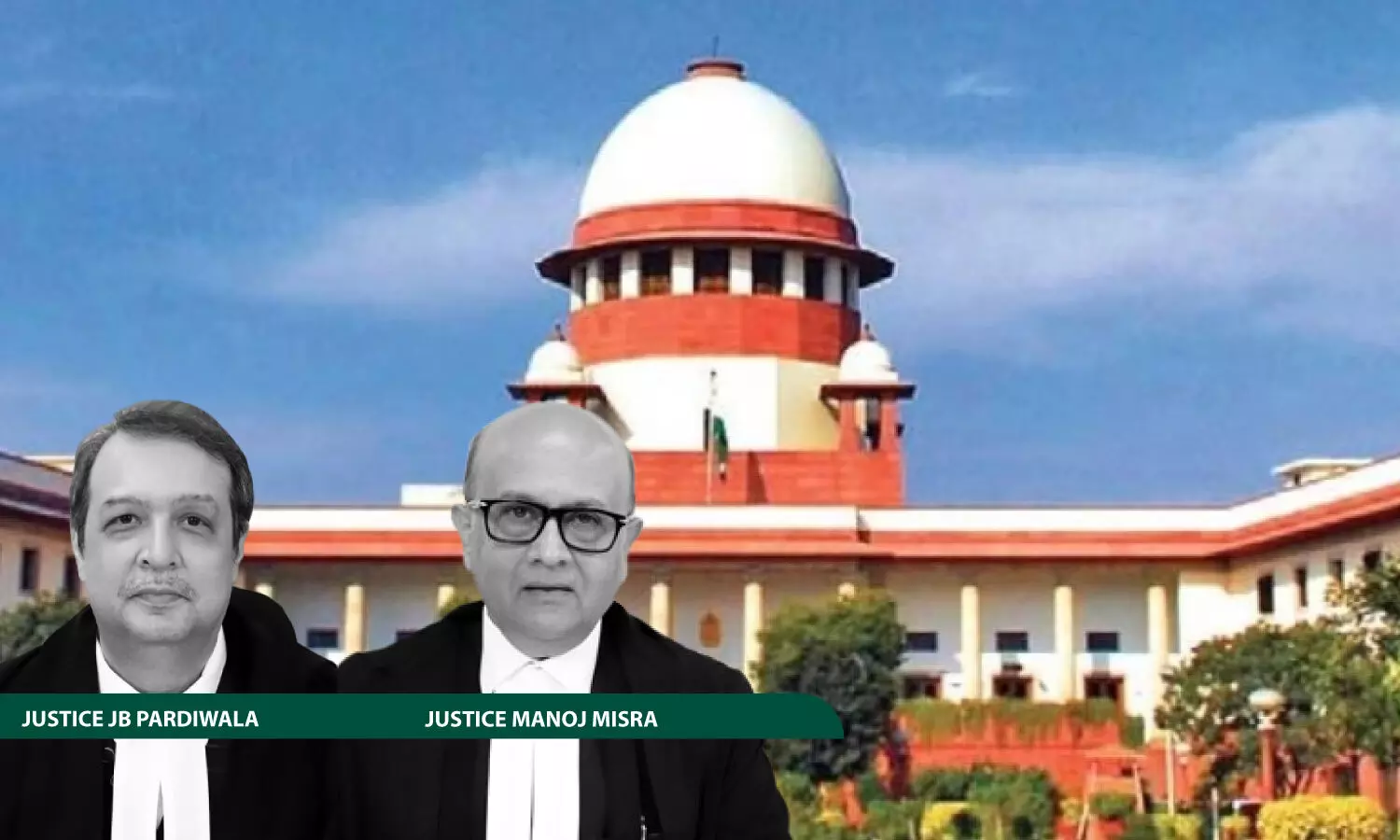
Mere Mention Of Psychotropic Substances Under D&C Regime Won’t Take Them Away From Purview Of NDPS Act: Supreme Court
 |
|The Supreme Court observed it cannot be said that the dealing in of “Buprenorphine Hydrochloride” would not amount to an offence under Section 8 of the NDPS Act owing to the fact that the said psychotropic substance only finds mention under the Schedule to the NDPS Act and is not listed under Schedule I of the NDPS Rules.
The Supreme Court held that mere mention of certain psychotropic substances under the D&C (Drugs and Cosmetics) regime would not take them away from the purview of the Narcotic Drugs and Psychotropic Substances Act, 1985 (NDPS Act), if they are also mentioned under the Schedule to the NDPS Act.
The Court held thus in Criminal Appeals filed against the Judgment of the Delhi High Court, which rejected the respective Petitions having found no legal infirmity in the Orders of the Trial Court arriving at the conclusion that no offence under Sections 8, 22 and 29, and under Section 8(c) and 22(c) of the NDPS Act could be said to have been made out since the psychotropic substance in question do not figure in Schedule I of the NDPS Rules, 1985.
The Trial Court had ultimately transferred the matter to the Metropolitan Magistrate with a direction to proceed in accordance with the provisions of the Drugs and Cosmetics Act, 1940 (D&C Act).
The two-Judge Bench comprising Justice J.B. Pardiwala and Justice Manoj Misra observed, “All the psychotropic substances mentioned under the Schedule to the Act have potential grave and harmful consequences to the individual and the society at large, when abused. Some psychotropic substances mentioned under the Schedule to the NDPS Act are also mentioned under the D&C Act and the rules framed thereunder. This is only because those substances while capable of being abused for their inherent properties could also be used in the field of medicine. However, the mere mention of certain psychotropic substances under the D&C regime would not take them away from the purview of the NDPS Act, if they are also mentioned under the Schedule to the NDPS Act.”
The Bench also observed that it cannot be said that the dealing in of “Buprenorphine Hydrochloride” would not amount to an offence under Section 8 of the NDPS Act owing to the fact that the said psychotropic substance only finds mention under the Schedule to the NDPS Act and is not listed under Schedule I of the NDPS Rules.
Additional Solicitor General (ASG) Vikramjit Banerjee and AOR Arvind Kumar Sharma appeared for the Appellants while AOR Yash Pal Dhingra appeared for the Respondents.

Factual Background
In the lead Appeal, an Officer of the Department of Revenue Intelligence Headquarter [DRI(HQ)] received an information that several glass ampoules containing the injectable preparation of Buprenorphine were stored in an office premises located at New Delhi. The further information was that the injections were illegally manufactured and cleared by the company and that a few injections along with the raw materials of Buprenorphine could also be found at that location. Two teams of DRI(HQ) officers were deputed – one team to undertake the search of the premises in Delhi and another team who coordinated their action with the office of Central Excise Commissionerate, Rohtak (CEC) for the purpose of search at the premises of Win Drugs Ltd. at Jind, Haryana. Since the Respondent could not provide any permission or licence for the possession of the recovered glass ampoules, they were seized under the NDPS Act. In response to the summons issued, the Respondent appeared and admitted the fact that the accused persons (Respondents) were collectively involved in the illegal manufacture, storage, transport, sale, and purchase of Buprenorphine Hydrochloride along with a person of Win Drugs Ltd.
Consequently, the Respondent was arrested for the alleged commission of the offence punishable under Sections 22 and 29 of the NDPS Act respectively and was remanded to judicial custody. Thereafter, the Special Court observed that Buprenorphine is a psychotropic substance as per the Schedule to the NDPS Act and its commercial quantity is fixed at 20 gms. The Respondents applied for bail before the Special Judge and the same was declined. However, the High Court granted bail to them. The Appellant i.e., DRI filed a Petition for Special Leave to Appeal against the High Court’s Order but the Apex Court declined to interfere with the grant of bail. The Respondents then filed an Application before the Special Judge for amendment/alteration of charge, which was allowed. The Appellant filed a Criminal Revision Petition but the High Court dismissed it. Hence, it approached the Apex Court.
Issues for Determination
The following issues arose before the Court for consideration –
I. Whether the production, manufacture, possession, sale, purchase, transport, warehouse, use, consumption, import inter-State, export inter-State, import into India, export from India or transhipment of a psychotropic substance which is listed under the Schedule to the NDPS Act but not mentioned under Schedule I of the NDPS Rules would constitute an offence under Section 8(c) of the NDPS Act?
II. Whether the decision of the Supreme Court in Union of India & Anr. v. Sanjeev V. Deshpande (2014) must operate with prospective effect?
III. Once, the charge has been framed by a competent court under Section 228 of the CrPC, can an accused thereafter seek for discharge/deletion of a particular offence from the charge under Section 216 CrPC?
Reasoning
The Supreme Court in view of the facts and circumstances of the case, noted, “The object sought to be achieved under both the legislations is also distinct i.e. the NDPS Act is a special law enacted to regulate the operations relating to narcotic drugs and psychotropic substances with a view to curb and penalise the usage of drugs by persons for intoxication etc., whereas the D&C Act was enacted to prevent substandard, adulterated and spurious drugs from entering the medical market and to maintain high standards in medical treatment. Hence, offences under both the enactments can also be said to have been constituted simultaneously, where the circumstances so require.”
The Court further noted that in both the Appeals, the Trial Courts vide their Orders, deleted the charge framed for the offence under the provisions of the NDPS Act and then transferred the file to the Court of the Metropolitan Magistrate for proceeding in accordance with the provisions of the D&C Act, without arriving at a decision to acquit the accused as regards the charges already framed under the provisions of the NDPS Act.
“The same is impermissible under the scheme of our criminal procedure code and both the Trial Courts could be said to have committed a grave error while reaching the conclusion that as the offences were not triable by them, the case should be transferred to the court of the Metropolitan Magistrate respectively”, it added.
Moreover, the Court said that there exists nothing to indicate that Rules 53 and 64 of the NDPS Rules respectively, are the governing Rules in their respective Chapters, more so, when the language of the other Rules in Chapters VI and VII respectively, are clear about their application to the substances mentioned under the Schedule to the Act as well.
“There arises no occasion for us to declare the interpretation given to Section 8 of the NDPS Act and the relevant NDPS Rules, by the decision in Sanjeev V. Deshpande (supra), as prospectively applicable. There exists no overwhelming reason for us to do so”, it also said.
The Court emphasised that in order to meet the ends of justice and with a view to ensure that public interest is safeguarded and to give effect to the salutary object behind the enactment of the NDPS Act, the decision must necessarily be retrospectively applicable.
“As a natural corollary to the aforesaid, we see no reason why we should deviate from the default rule of retrospectivity and instead, resort to the doctrine of prospective overruling. Therefore, pending cases, if any, which were instituted before the decision of this Court in Sanjeev V. Deshpande (supra) would also be governed by the law as clarified by it”, it clarified.
Furthermore, the Court observed that the retrospective application of the dictum in Sanjeev V. Deshpande case would not give rise to any implications as regards the rights of the accused persons under Article 20(1) of the Constitution.
“… the overruling of a decision cannot be equated to the enactment of an ex-post facto law, especially when the interpretation given to the statute/provision in the overruling decision is not a novel and unreasonably expansive interpretation of the provision in question such that it was completely unforeseeable”, it added.
Conclusion
The Court held that giving retrospective effect to the decision in Sanjeev V. Deshpande case would be necessary in view of the facts and circumstances in the background of which it is called upon to adjudicate these matters.
“We are, therefore, of the view that both the Trial Court and the High Court committed an error in holding that the offence under the provisions of the NDPS Act is not made out. The Trial Courts in both the appeals could also not have discharged/deleted the charge under the NDPS Act framed against the accused persons while disposing of an application under Section 216 CrPC. This is something not permissible within our criminal procedure and the High Court unfortunately failed to take notice of this aspect”, it concluded.
The Court, therefore, directed that the accused persons be tried by the Special Judge and that the Trial Courts shall proceed with the trial and conclude it expeditiously.
Accordingly, the Apex Court allowed the Appeals and set aside the High Court’s Orders.
Cause Title- Directorate of Revenue Intelligence v. Raj Kumar Arora & Ors. (Neutral Citation: 2025 INSC 498)